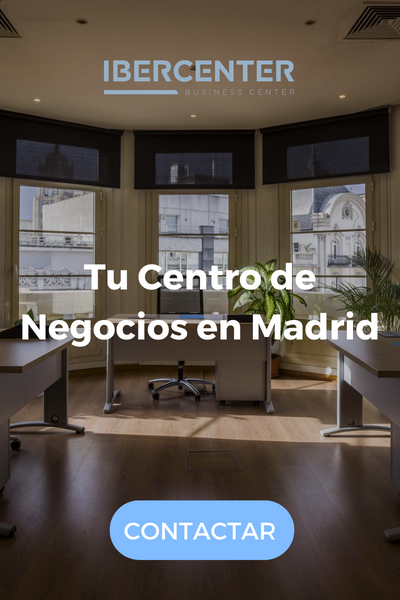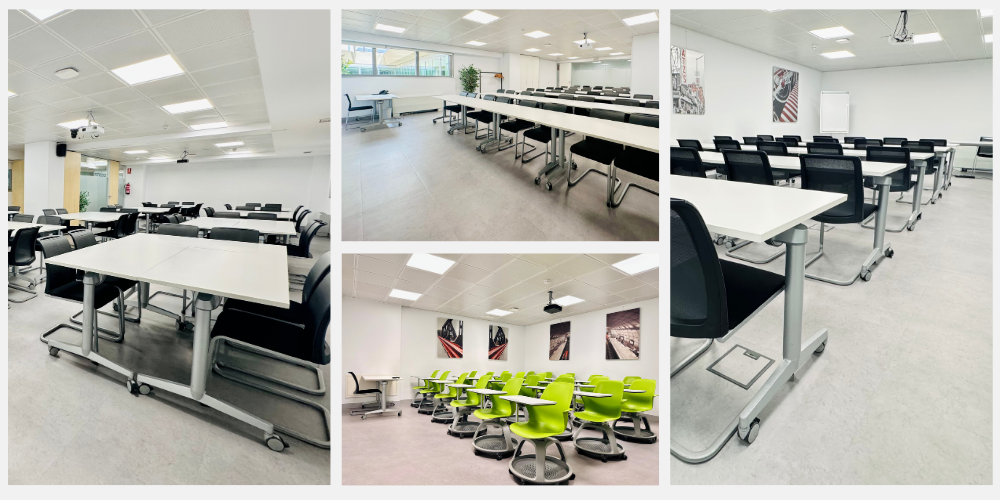Discover how personal branding can impact your business
In an increasingly competitive world, developing and nurturing your personal brand has become an essential tool for business success. Whether you are just starting out or already have an established track record, your image and the way you communicate with your audience can make the difference between standing out and going unnoticed. By building a strong personal brand, you not only project confidence and professionalism, but you also create a network of contacts and opportunities that will allow you to grow and position yourself in your industry.
In addition, if you work from a business centre such as Ibercenter, you can take advantage of services such as office rental in Madrid, coworking spaces or even the option of domiciling a company in Madrid, which will help you to give a more professional and accessible image. Your personal brand is not only limited to what you transmit in person or on social networks but is also reflected in the environment where you develop your activity. Therefore, choosing the right space is key to strengthening your presence and generating a positive impact on your clients and collaborators.

What is personal branding?
Personal branding is the image and perception that others have of you, especially in the professional sphere. It is much more than just a logo or a CV; it is the sum of your values, skills, experiences and the way you communicate them all. When you consciously manage your personal brand, you build a solid reputation that can open doors and differentiate you in a competitive market. In a dynamic business environment, a strong personal brand is essential to stand out and build trust.
To enhance your personal brand, it is important to take care of all aspects that reinforce that professional image. This includes everything from your online presence to the way you interact with colleagues, clients or potential partners. Being consistent, authentic and strategic in the way you communicate who you are and what you offer is key to positioning yourself effectively and achieving your professional goals.
The relevance of personal branding in business
In today’s business environment, where competition is increasingly fierce, your personal brand becomes a critical asset. It is not just about how you are perceived by others, but about the footprint you leave in your industry and with your customers. A strong personal brand can open doors, facilitate strategic alliances and help you stand out against a broad and competitive offering.
Investing time and effort in building your personal brand allows you to position yourself as a reference, add value to others and consolidate your reputation. In today’s dynamic market, your professional image will be key to boosting your business, building trust and taking advantage of new opportunities.
Differentiation in the market
In a saturated market, differentiation is essential for your proposition to stand out. Your personal branding acts as a unique stamp that separates you from the competition. By clearly defining who you are, what you offer and what your values are, you capture the attention of those who are looking for precisely what you can bring to the market.
This differentiating element positions you in the minds of customers, giving you a competitive advantage that is not based exclusively on price or product, but on the trust and perception that you generate as a professional or company. In short, it allows you to stand out naturally and authentically in an increasingly demanding business environment.
Building trust and credibility
Trust is the basis of any lasting business relationship and personal branding is the most direct way to build it. When you take care of every detail of your professional identity and show consistency between what you say and what you do, your clients, suppliers and collaborators perceive you as trustworthy. This is especially relevant if you offer services that require commitment and responsibility.
In addition, a well-established personal brand makes it easier for potential clients to feel confident in choosing your services, knowing that they will receive quality and professionalism. This trust built over time translates into recommendations, loyalty and a solid positioning in the market.
On the other hand, you should not forget that credibility also implies transparency and constant communication. By sharing interesting content, testimonials or success stories related to your activity, you will reinforce the perception of honesty and commitment, fundamental aspects for maintaining stable and fruitful business relationships.
Benefits of a strong personal brand
Having a strong personal brand is one of the best investments you can make in your professional and business development. Not only does it help you differentiate yourself in an increasingly competitive marketplace, but it also enhances your credibility and trustworthiness with clients, collaborators and potential employers. A strong personal brand allows you to clearly convey who you are, what you stand for and what your values are, making it easier for them to remember you and choose you again and again.
A strong personal brand exponentially multiplies the job opportunities that come your way. When you position yourself clearly, it is easier for you to capture the attention of recruiters, partners or potential clients. This means that instead of chasing opportunities, they will find you, saving you time and effort in the search for new projects or jobs.
Improving your network
Your network is one of your most valuable assets and a well-defined personal brand helps you to expand it naturally and effectively. When you communicate your skills and goals consistently, people tend to approach you with greater interest and willingness to collaborate. This increases the quality and quantity of professional relationships, which can be vital to your growth.
Moreover, maintaining strong professional relationships means not only increasing the number of contacts, but also deepening them. This will provide you with a real collaborative and supportive group that will translate into concrete opportunities and practical resources for your business. For example, when you need a space that suits your needs, such as offices or rooms, your network can provide you with recommendations and preferential treatment, speeding up your processes and decisions.
Strategies for developing an effective personal brand
For your personal brand to have a lasting impact, it is essential to work on strategies that authentically reflect who you are and what you offer. It’s not just about creating an attractive image but building a solid reputation that connects with your audience. You need to be consistent in all channels where you present yourself, from your social media profile to the physical spaces where you do business.
The first step to building an effective personal brand is to clearly define your values and your guiding mission. These should be a true reflection of what you really believe in and what you want to convey to the market. Think about what differentiates you from others and how you want to be remembered. When you have a well-defined purpose, it is easier for you to make coherent decisions and thus build trust with your customers or collaborators.
In addition, by stating your mission and values, you ensure that you create a consistent message that remains strong over time. This is especially relevant if you are looking for professional spaces such as offices or coworking spaces, as a place that reflects your personality and principles can greatly reinforce the perception of your personal brand.
Creating relevant and authentic content
For your personal brand to remain relevant and engaging, it is essential that you generate content that brings value to your audience. This content should be authentic, reflecting your own voice and style, not simply replicating what others are doing. When you share your knowledge and experiences honestly, you build a loyal community and establish a relationship of trust.
In addition, the content you generate should cover topics that interest the people you want to connect with and that are aligned with your values and mission. Thus, each publication, article or video will be one more piece of your global strategy to position yourself as a reference in your sector.
Remember that you can also take advantage of physical spaces to enrich your content and networking. For example, by renting a room in Madrid for events or presentations, you offer a professional touch that can enhance the credibility of your personal brand and open new business opportunities.
The influence of social media on personal branding
In today’s world, where digital presence is almost as important as physical presence, social networks have become a fundamental tool to build and enhance your personal brand. Through platforms such as LinkedIn, Instagram or Twitter, you have the opportunity to show who you really are, what your values are and what you bring to the table professionally. It is crucial that you use these channels strategically, maintaining consistency in your messages and taking care of the image you project, as any publication can reach a wide audience and affect the perception they have of you as a professional.
In addition, if you manage a business or are developing your career, taking advantage of social media to connect with other professionals and potential clients is essential. You need to be present on these platforms will make it easier for you to make these resources known and reinforce your brand identity. Remember that a strong personal brand not only attracts opportunities but also builds trust in your professional environment.
Common mistakes in personal brand management
One of the most common mistakes you can make in managing your personal brand is not being consistent in the image and message you convey. If your online presence, from social networks to the website where you offer services, does not reflect a clear and uniform message, you run the risk of confusing your clients and losing credibility. Remember that trust is built with consistency and authenticity, not just advertising or one-off promotions.
Another common mistake is to underestimate the importance of choosing the right spaces where you project your brand. For example, if you decide to work in coworking spaces in Madrid or need to rent rooms for meetings with your clients, it is essential that these locations reflect professionalism and align with your identity. Ignoring these aspects can weaken your positioning and ultimately affect the perception that other companies and clients have of your business.
Conclusion
In short, understanding and caring for your personal brand is an essential investment for the sustainable success of your business. Not only does it allow you to differentiate yourself in an increasingly competitive marketplace, but it also builds trust and loyalty among your customers and partners. Building an authentic and consistent image makes it easier to open new opportunities and establish valuable relationships within your industry.
If you choose personal branding as a key strategy, you will see how it improves not only your reputation, but also your business opportunities. Your professional identity, clearly and authentically conveyed, will help you attract the right interest and build lasting relationships. In short, strengthening your personal brand is an essential step to grow and position yourself strongly in today’s business world.
Business Centre in Madrid | Coworking Spaces in Madrid




